A rare glimpse of daily life in occupied Ukraine
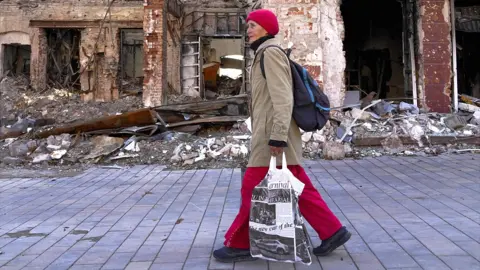 Getty Images
Getty ImagesFor all the coverage of the war in Ukraine, little has been heard about the daily lives of people in Russian-controlled areas. As Russia formally annexed four regions last week, the BBC has spoken to some of the millions about what life is like under occupation.
All names have been changed

Boris has lived in Kherson most of his life. He has asked us to disguise his identity - with Russian troops digging in and the Ukrainian army inching closer, civilians have learned to be extremely wary.
We communicate using a messaging service.
For months, he has tried to maintain his professional and personal life, in a city crawling with Russian soldiers and police officers.
It's a life full of striking contrasts.
One day, Boris breaks off a conversation with me to wipe content from his mobile phone before passing through a Russian checkpoint.
"You have to make sure there are no incriminating photos in your deleted folder," he says.
A lot of people disappeared in the early months, as the city's new rulers cracked-down on anyone thought to be loyal to Kyiv.
Judging by the reduced number of "disappeared, looking for" ads posted on walls and circulating on social media, Boris thinks the number of arrests has gradually declined.
Half the city's pre-war population of 280,000 left, seeking sanctuary in government-controlled territory or abroad.
Those who remained, Boris says, initially adjusted well - as citizens made up their own rules and avoided the authorities at all costs.
"For four or five months we felt we were living in a kind of libertarian society," he says. "Self-sustaining, self regulating."
All that came to an end in mid-July, when the city started to fill up with Russian secret service personnel, a process that intensified in the weeks leading up to the referendum.
"There were practically 20 cars per minute, with very serious men inside," Boris says.
Boris, like all the other people we have spoken to for this piece, are opposed to Russia's occupation and annexation. It would be wrong to suggest that everyone in these areas shares their views. But all the available evidence, including previous voting records, suggests that people living in areas seized since February this year overwhelmingly see themselves as Ukrainian.
However, early in the occupation, the situation brought unexpected benefits, Boris says.
"The city's really empty now and people can safely ride bicycles," Boris says. "It's quite post-apocalyptic."
The next time we communicate, he tells me about visiting a dacha (summer house) on the other side of the wide Dnieper River - known in Ukraine as the Dnipro. From there, you can see the Antonovsky Bridge, which has been repeatedly hit by Ukrainian artillery since July.
"We picked grapes for wine and had a sauna," he says. "It's something deep from our city culture."
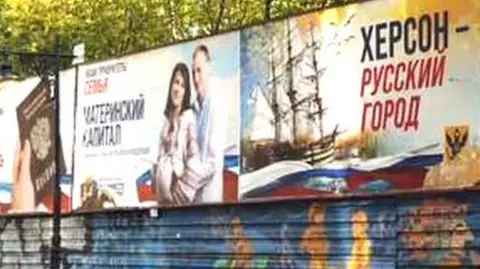
In Russian-occupied Kherson, holding on to what you value is a matter of constant improvisation.
Money is a good example.
Despite Moscow's efforts to introduce the Russian rouble, the Ukrainian hryvnia is still widely used.
For a while, small vans - equipped with wi-fi connections - enabled customers to log in to Ukrainian banks and make withdrawals in hryvnia. The van operators would charge a transaction fee of 3-5%.
Now, Boris says, the minivans are no longer needed - everything is done by word of mouth, as friends circulate the names of reliable dealers charging little or no commission.
But the Russian currency is steadily encroaching. Some welfare payments are already in roubles, which shops are obliged to accept. The only functioning banks are Russian.
To open an account, a Russian passport is required. The same thing applies to jobs in state enterprises.
"That's how they try to get most of the Ukrainians in town to convert to Russian citizenship," Boris says.
Another way is propaganda.
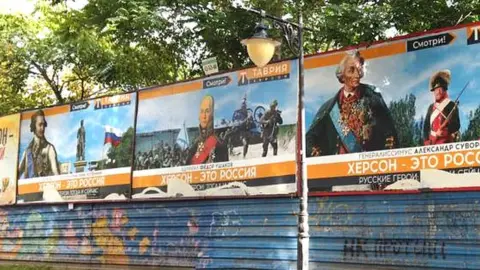
From May onwards, posters appeared on the streets declaring that Russia was back to stay.
Sometimes these slogans would be accompanied by images of 18th Century Russian heroes - stirring memories of Kherson's foundation as a fortress city by Catherine the Great, the last Empress of Russia, in 1778.
Other posters depicted Russian passports with the motto "Social Stability and Security," or a happy husband hugging his pregnant wife next to a message exhorting loyal citizens to have more children.
But there were other billboards that Boris found more insidious.
"They would picture some celebrity and say that this guy comes from Kherson and has dedicated his life to Russia. You feel a bit proud [generally] about that guy, and they use that pride to connect you to Russia."
For Kherson's solidly pro-Ukrainian majority, Boris says, the messaging has little effect.
"But for those who were brainwashed before the war," he adds, "this just allowed them to come out of the shadows."
During the so-called referendum in Kherson, Boris says he saw several elderly women contentedly walking away from a voting centre, carrying candyfloss and little Russian flags.
"Probably, some cheer-up by the organisers," he says.
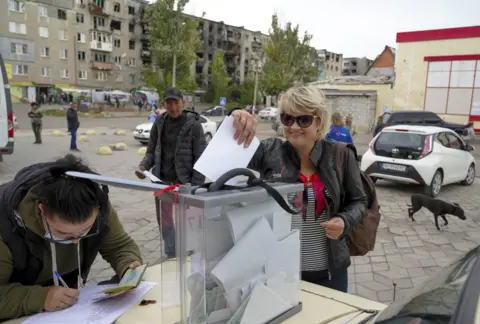 Getty Images
Getty ImagesOther battles, for culture, history and information, are going on throughout newly occupied Ukraine - from residents straining to catch mobile phone signals across front lines, to parents covertly educating their children in online Ukrainian schools (one of Covid's more beneficial legacies) to avoid an education system now under complete Russian control.
"The kids learn online at Ukrainian schools, using Russian internet and Western VPNs," Boris says. "It's quite ironic."
The fight to stay connected to Ukraine is part of what has kept him going for more than half a year.
"Either you mobilise yourself or you just fall apart," he says.
But the referendums, long anticipated but constantly put off, have threatened to shatter his sense of purpose.
"It's devastating," he replies, when I message him to ask how people feel about the ballot.
"Panic. Losing hope… Depression. Apathy."
"Why does it take ZSU [the Ukrainian forces] so long?" he asks, referring to their slow advance towards Kherson.
The fear now among men of fighting age is that conscription, well under way in Russia, Crimea and separatist areas of Ukraine's eastern Donbas region, will be extended to Kherson.
So far, it seems only those who have taken Russian passports have been told to join up, but anxiety is on the rise.
Boris says he is conflicted about whether to flee or stay on, in the hope that one day he will wake up to find Kherson has been liberated by the Ukrainian army.
"I'm torn between safety and the unique experience of meeting Ukrainian soldiers [entering the city]."
If liberation is the prospect that sustains Boris, it feels much less likely in Mariupol, 260 miles (418km) to the east.
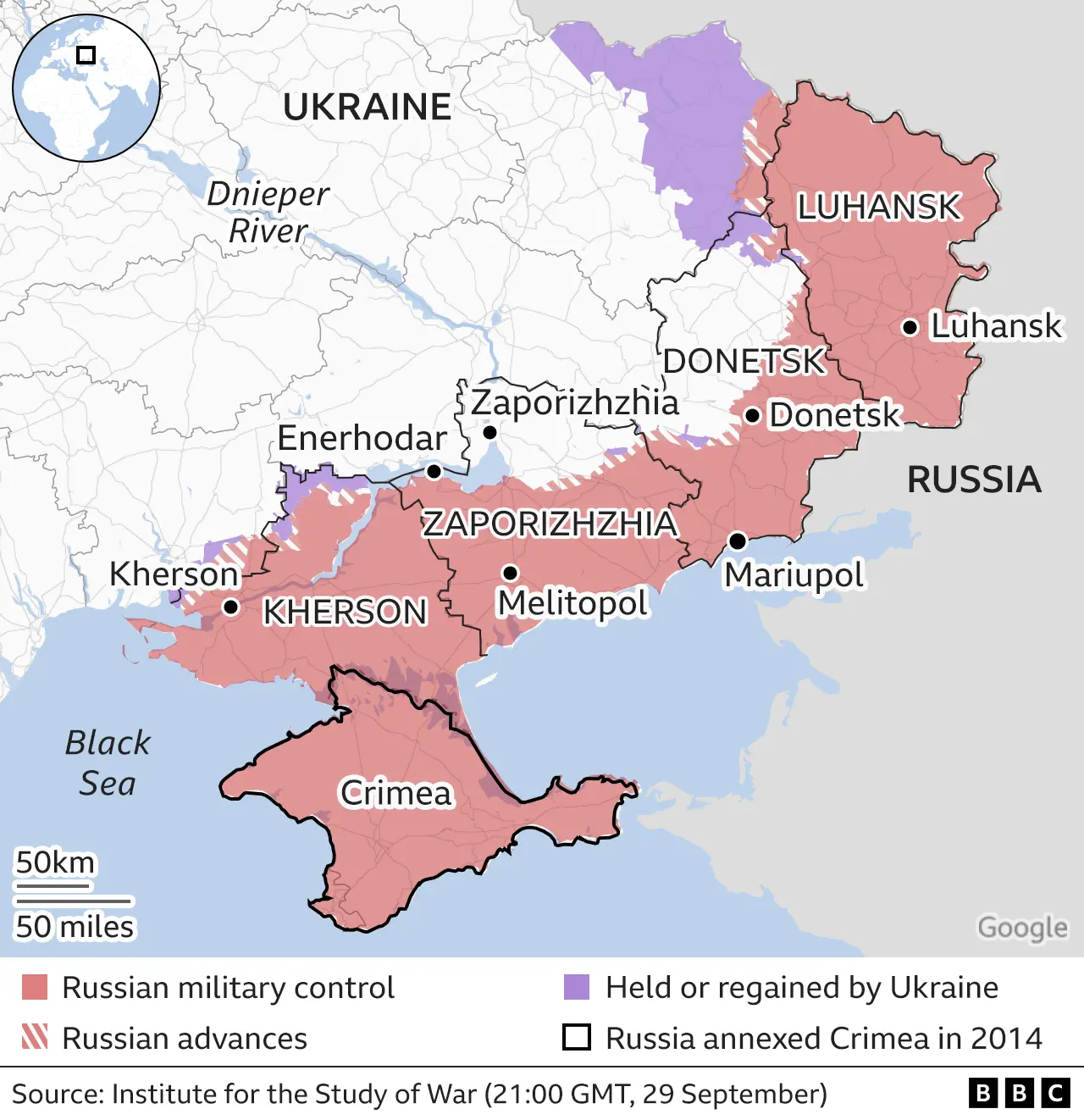
"After the occupation, my whole life broke down," says a former teacher who asked to be called Alex.
After a hellish siege, which captured global attention between March and May, those civilians who wouldn't or couldn't flee found themselves living in a wasteland.
"Russians went from apartment to apartment, destroying everything connected with Ukraine," says Alex, also communicating via a secure messaging app.
"At my home, they burned Ukrainian symbols and a lot of books."
When the siege ended in late May, Russian soldiers gradually withdrew, leaving pro-Moscow separatists from the self-proclaimed Donetsk People's Republic to run the city.
"The city turned into a ruin," says Daryna, a student who stayed on but finally fled in August.
"It became a big market where everyone sold what they could to earn something."
Electricity and water were in short supply. Thousands of homes were destroyed. Bodies lay unburied in the rubble.
But Daryna says the streets were quickly flooded with banners hailing Mariupol's liberation by Moscow.
A combination of propaganda, necessity, and pro-Russian sentiments among some Mariupol residents, has had an effect, she says.
"Many people support the occupiers and many people work for the 'rashists' [a derogatory term for Russians] because they need money so they don't die of hunger."
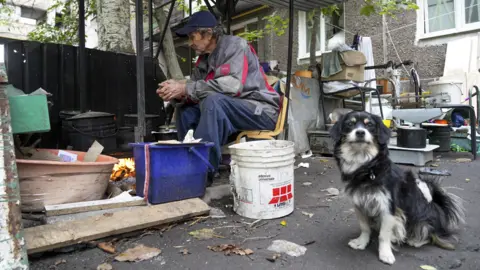 Getty Images
Getty ImagesPhysically closer to Russia and sitting at the southern end of the Donbas, Mariupol's ties with Moscow were always a little deeper than Kherson's.
Fleeting glimpses of resistance can be seen on social media, where images circulate of masked people draped in the blue and yellow Ukrainian flag.
The letter "Ï", which exists in the Ukrainian alphabet but not the Russian, has appeared on walls throughout occupied Ukraine.
But Mariupol has been physically and emotionally trashed by war. Optimism is in short supply.
"There is not a lot of hope left," Alex says, "because [people] believe that Mariupol was abandoned. But still they hope."
In Mariupol, the sound of war has receded. In Kherson, it's getting closer. But in Enerhodar, midway between the two, it has never really gone away.
Russia captured the city and its vast nuclear power station early in the war. But in recent months, Russian and Ukrainian forces have exchanged gunfire across the Dnieper (Dnipro) River, with Ukraine accusing Russia of using the power station as cover.
The constant danger of explosions has forced the people of Enerhodar to adopt strict routines.
"You try to get all your work done during the day - see friends, visit parents, buy food," says 38-year old Maksym.
"At night, dogs run the streets."
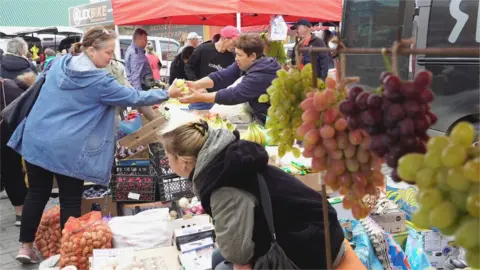 Getty Images
Getty ImagesFood, which disappeared from the shops early on, is less of a problem than it was. Across the south, everyone says the same thing - supermarkets are stocked with expensive, undesirable Russian products, while street markets are full of locally-produced food.
Cut off from 80% of Ukraine, farmers have to sell their produce locally. Vegetables are cheaper, but meat, cheese and milk cost double what they did before the war.
"Money is now spent only on food," Makysm says.
After more than half a year of occupation, Enerhodar is half empty. Many of those who remain are elderly.
"Everyone who was able to leave has left, especially mums with kids," says Natalya, a pensioner.
Natalya says she misses her daughter and granddaughter, but is glad they are somewhere safe in Europe.
With no gas for the past four months, and frequent power cuts, life for Natalya is a constant struggle, particularly with winter now looming.
"We have been isolated for seven months, cut off from civilisation. A mobile connection is rare. To have the internet is like a holiday."
But like Boris in Kherson, she does her best to follow the news.
The pensioner rattles off the names of Ukrainian military analysts, saying their forecasts suggest liberation is not far off.
Sometimes she walks down to the banks of the Dnieper (Dnipro), hoping to catch a mobile phone signal from Ukrainian government-controlled territory on the other side.
Again, it's all about clinging on.
In Russian-controlled Melitopol, far from the front lines and deep inside occupied southern Ukraine, Toma, a woman in her 30s, speaks of another routine preoccupation - caring for the sick.
"For several days at the beginning, I had a quest," she says. "To find medicine for my mother, who suffers from heart disease."
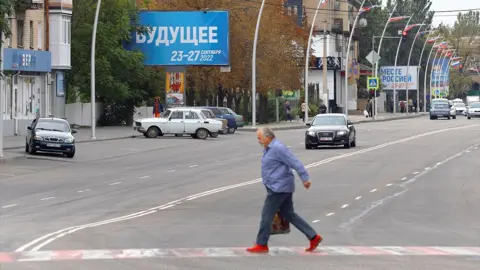 Reuters
ReutersThe long queues of the spring, where hundreds stood in line for hours, have gone. But Toma says pharmacies are now run by the authorities and stocked with what local people regard as inferior Russian products.
Four of the five drugs her mother needs are unavailable.
They have to be purchased by friends or relatives further north, in Ukrainian-controlled Zaporizhzhia, and then delivered by hand - which involves a risky journey through Ukrainian and Russian checkpoints.
In the midst of this hand-to-mouth existence, with jobs not available and people forced to trade their belongings, the appearance of posters quoting President Vladimir Putin's observations on the future of life in Russia feels like an added insult, Toma says.
"It's like we were thrown back 35 years," she says, referring to the days when Ukraine was still part of the Soviet Union.
The situation in Melitopol's schools, she says, is disastrous.
Teachers and administrators have refused to co-operate with the occupation authorities, forcing them to recruit anyone willing to accept a job - however unqualified.
"The former school cleaner became the class teacher of our friends' child," she says.
Russia's mark is everywhere, from imported textbooks to the flag that flies in the school courtyard and the national anthem played at the start of every day.
Parents willing to send their children to school are offered 10,000 roubles (about £150) each, but only if they provide the passport information and place of residence of the child's father.
But, says Toma, there are signs of rebellion in the classroom.
"Children write Russian words in Ukrainian letters, hang blue and yellow ribbons on their backpacks, and wear socks with the slogan 'Russian warship [expletive]'," - a reference to an act of defiance by the Ukrainian defenders of a tiny Black Sea island on the first day of the war.
Additional reporting by Cara Swift
